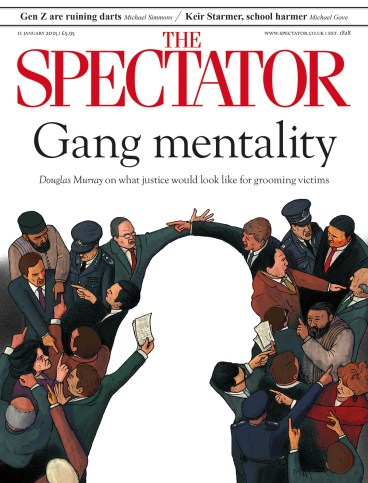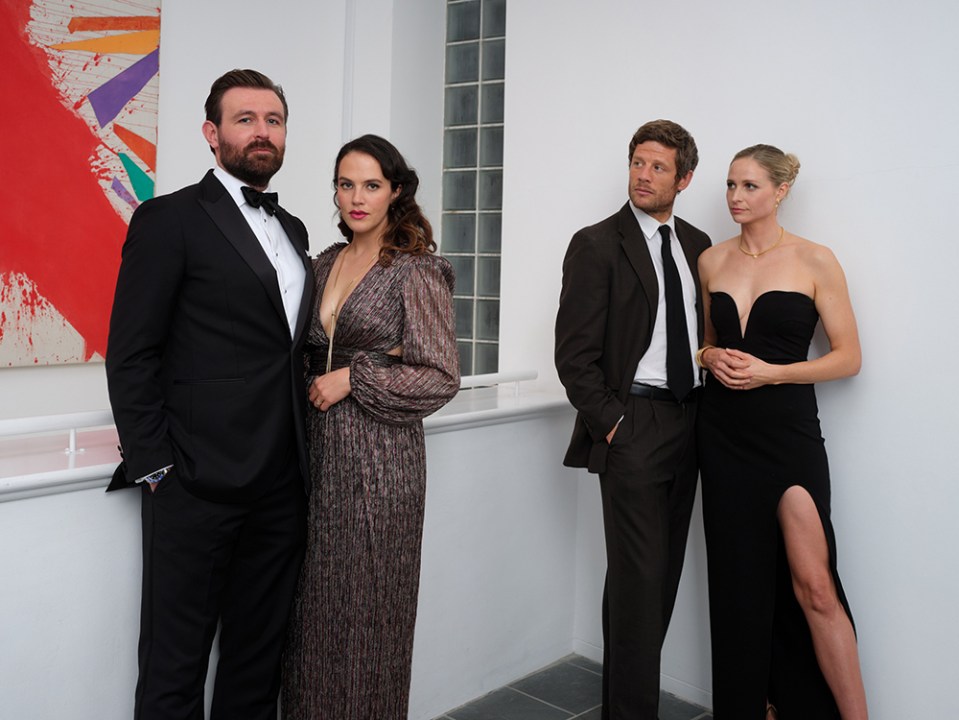
There must have been a time when slow-burn psychological thrillers didn’t start with a scene of high drama followed by a caption that reads ‘Three months earlier’ – but if so, it’s getting hard to remember it. The latest programme to deploy the tactic was Playing Nice, which began with James Norton running towards the sea screaming ‘Theo!’ as a child’s body bobbed, face-down, in the waves. He was next seen, post-caption, laughing with his pre-school son in various picturesque Cornish locations while using the word ‘buddy’ a lot. Not to be outdone in the great-parent stakes, his wife also piled on the cuddles for little Theo.
Before long, Miles had developed the habit of glowering menacingly when nobody was watching
This idyll, however, didn’t last long. The couple – now identified as Pete and Maddy (Niamh Algar) – were summoned to the local hospital and told that, owing to an unfortunate mix-up, they’d been given the wrong baby three years earlier. Their biological son, it transpired, was David, whose equally misled parents, Miles and Lucy (James McArdle and Jessica Brown Findlay), lived in a spectacular clifftop house straight out of Grand Designs.
After an emergency summit, it looked as if the two parties had come to a civilised agreement: each couple would keep the child they’d bonded with, but also become part of the other’s life. This idyll, however, didn’t last long either. As Pete and Maddy continued to live up to the programme’s title, we began to realise that Miles might not be the good-natured charmer we’d originally taken him for.
At first, this was signalled only by a tendency to perhaps overdo the smiling. But before long, he’d developed the habit of glowering menacingly when nobody was watching. By the end of the first episode, he’d served Pete and Maddy with court papers demanding custody of both children.
In the second episode, the gloves were off completely. During a mediation meeting, Miles regretfully opined that Pete and Maddy were unfit parents. He also twisted everything they’d confided in him when he’d seemed nice – including Maddy’s postnatal depression – into proof that Theo wouldn’t be safe with them. And that was just for starters…
At a time when ITV dramas are enjoying something of a golden age, all this was beautifully done, with the gradualness of Miles’s metamorphosis into full-blown villainy as chilling (and baffling) to us as it was to Pete and Maddy. In fact, with two parts to go, my only reservation is that opening scene – which now seems not merely a television tic, but a definite miscalculation.
Playing Nice really is a slow burn, but I do wish the makers had had enough confidence to let the burn take place without us having any idea where it might lead, rather than nervously feeling the need to assure us that something unequivocally dramatic will happen in the end.
The opening episode of Simon Schama’s Story of Us gave the distinct impression of somebody trying hard – not always successfully – to hold on to a lifelong faith.
‘We live in divided times,’ Schama began, but he was clearly keen to believe that ‘our common culture’ could yet save the day. And from there he did his slightly desperate best to prove it by means of a rather random trawl through postwar British history.
Schama started at the 1951 Festival of Britain which, as a six-year-old, he’d marvelled at – and, as a man approaching 80, he sees (or tries to see) as an enduring sign of hope. ‘A united act of national reassessment’, it both honoured the country’s past and heralded a jet-propelled future. He also noted that the Festival’s logo was designed by Abram Games, who was ‘equally passionate about being Jewish and British’ – something Schama would plainly like us to remember now that we’re being ‘hustled into our particular identity camps’.
Sadly though, even the Festival of Britain was only ‘a fleeting moment of national togetherness’. For one thing, class divisions remained – which led to a lengthy, admiring discussion of Alan Sillitoe’s novel Saturday Night and Sunday Morning. For another, women were far from liberated – which led to a lengthy, admiring discussion of Pauline Boty.
Schama was as illuminating as ever on these two subjects, as well as on Lord Longford’s crusade against the permissive society, the permissive society’s crusade against Lord Longford and plenty more besides. Less clear was his overarching argument. At times, he appeared to suggest that hearing a vigorously expressed range of opinions is an unalloyed good; at others, that this is precisely what’s led to today’s ‘anarchy of the equally self-righteous’.
So can national unity ever be restored? Again, Schama didn’t seem able to make up his mind. He is, he told us, ‘not so naive as to think culture can fix everything’ – but then concluded, with a kind of fingers-crossed belief, that one day it just might.








Comments